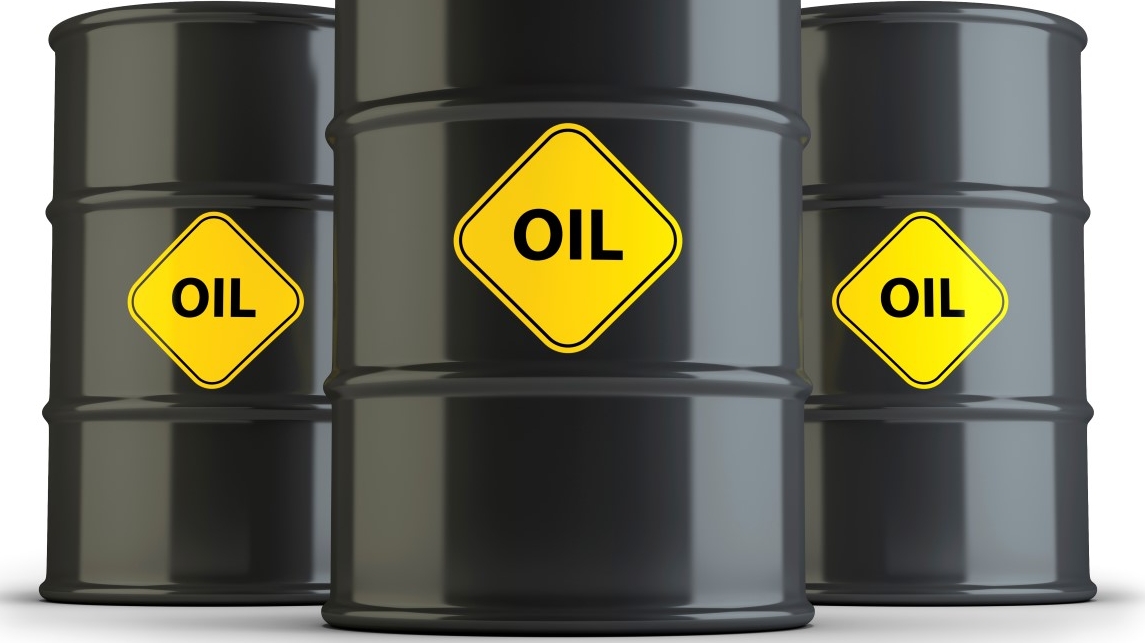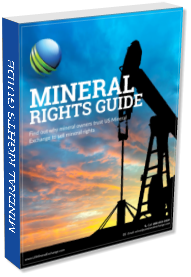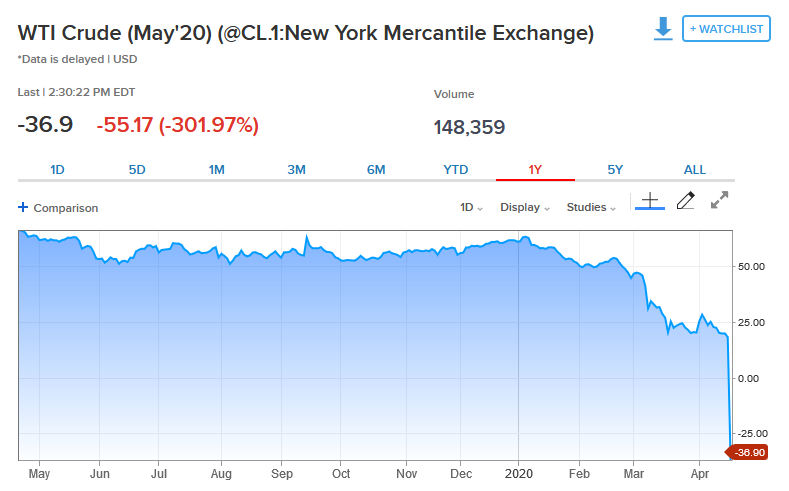
Negative Oil Prices Impact on Royalty Checks
In a historic move, oil prices for May 2020 delivery have turned negative! Many mineral owners are now wondering what this means for their royalty checks. We’re going to break down the situation and help mineral owners get a better understanding of exactly what is happening. Negative oil prices will certainly have an impact on mineral owners but it’s important to see the full picture.

FREE GUIDE
Download our free mineral rights guide now! Learn more about your mineral rights.

Garrett Phelan
CEO of US Mineral Exchange with over 27 years of experience in the oil and gas industry. For nearly two decades, he has helped individuals, families, trusts, and non-profits navigate the complexities of mineral and royalty rights to achieve the highest sale prices.
Widely recognized as an industry expert, with an unwavering commitment to a client-first philosophy and extensive industry knowledge, he has been featured in Hart Energy, Yahoo Finance, and the Permian Basin Petroleum Association magazine.
Why are oil prices negative?
As we discussed in our recent Coronavirus article, there are a couple of things working together to tank the price of oil. The first is demand. With Coronavirus bringing the US economy to stand still, there is very little demand for oil. Many people are working from home, not working, and not going anywhere outside of work. Vacations have come to a stop so unless you’re traveling for a necessary reason there simply aren’t many people driving. In addition, US airlines have reduced flights by over 90%. This is obviously not a situation unique to the United States. This is happening all over the world. The demand for oil has simply been decimated. There is no demand for the oil coming out of the ground.
The other major issue is supply. Over the years oil and gas operators in the United States have become experts at extracting oil and gas. This has led the US to flood the market with supply over time. This is the primary reason we saw oil prices retreat from the over $100/barrel prices we were seeing back in 2014 and before. With the increase in supply the price has been driven down.
What this has done is create a perfect storm. There is simply too much oil supply and very little demand to actually use the oil being produced.
The storage tanks are full
One of the obvious questions is why not just store the oil and wait for prices to rise. The problem here is that oil storage capacity is full. Since there is no where to put the oil it must be sold. Individual producers do not have storage to handle the massive amount of supply coming out of the ground. This means they have no choice but to sell the oil.
How do negative prices work?
The picture below shows the price of oil on 4/20/2020 near one of the lowest points. Oil was down to negative $36.90/barrel. What this means is that if you must sell a barrel of oil today, you will have to pay $36.90 for someone to take that barrel of oil. This is likely a one day “trading” issue and does not mean we will have negative oil for the long term. However, what it does mean is that oil storage capacity is at or near capacity. Oil and gas companies will obviously not “sell” oil for a loss in the long term. This means they have one choice….shut in wells. Once wells start getting shut in you will no longer be receiving oil and gas royalty checks.

Royalty checks will drop substantially
If you are a mineral owner who gets royalty checks that are mostly related to oil, you will see a substantial drop in your income. As the the price of oil continues to drop you will see much lower royalty checks. Negative oil and gas prices will have a negative effect on royalty checks. At the beginning of 2020 oil prices were hovering around the $50/barrel range. With oil prices at $25 or less, it is very likely that royalty checks will be 50% or lower of what you were receiving in January 2020 (for production in late 2019).
While you may be getting substantially lower oil royalty checks, you might also start getting $0 if wells are shut in. The major problem is that there is simply too much oil, no demand to use it, and nowhere to put it! At some point, there won’t be any option but to shut in wells and keep the oil in the ground. This means royalty checks will stop entirely.
Hedging may save royalty owners
In the short term, the oil and gas operator may have hedged their production. Many larger E&P companies hedge oil prices from 1 to 3 years out. If your company hedged prices at $50/barrel, and they pass that hedge along to you, you may not see a material decline in royalty checks due to negative oil prices. Keep a close eye on your royalty checks. There is a “Product” column typically located on the left side. If your product code is “O” for oil, it will have a price listed. Each month keep a close eye on what oil price they are paying you for. They may be producing a similar volume of oil, but if the price drops substantially you will get less royalty income.
Sell Oil and Gas Mineral Rights
If you are in a position where you want to sell oil and gas mineral rights, US Mineral Exchange can help. Now more than ever, you need to ensure you are getting the best price possible. There is no way around the fact that your mineral rights are worth less today due to negative oil prices. However, there is still demand for oil and gas mineral rights. If you need to sell mineral rights fill out the free consultation form below.
Popular Content
- Sell Mineral Rights
- Mineral Rights Value
- Calculate Value
- Market Value
- Mineral Rights Buyers
- Mineral Rights Appraisal
- Mineral Rights Brokers
- Should you Sell Mineral Rights
- Never Sell Mineral Rights
- 10 Helpful Tips
- Mineral Interest Types Explained
- Common Mistakes
- Mineral Rights & Taxes
- Medicaid & Mineral Rights
- Common Q&A
Free Consultation
Free Consultation
Common Questions
The more information you can provide about your property the better! We can give you a better idea about the value of selling mineral rights if you provide more information. The most important thing we need is for you to answer the questions and provide your state and county.
If you have the required documents to list, providing those is extremely helpful!
Absolutely not! When you inquire at US Mineral Exchange we will not be putting any pressure on you to sell. We will help answer any questions you have whether you are interested in selling or not.
At US Mineral Exchange, we take privacy very seriously. We will NEVER sell your information or use it without your consent. When you send us documentation or tell us about your property, that information does not go outside our company without your consent. Even when you list a property for sale on our website, we strictly control who has access to the information about your listing so that only legitimate buyers will be able to see property details.
Many mineral owners make the mistake of getting an offer and quickly selling. They then accept an offer far below market value because they felt pressure to sell. There is nearly always a better price available.
Imagine you were selling a home. Would you get the best price from a random person who walks up and makes you an offer? No way! Now imagine you list the home on the MLS where thousands of potential buyers know your house is for sale. The key to getting the best price is competition. Our guide to selling mineral rights explains everything.
The reason that so many mineral owners decide to sell mineral rights at US Mineral Exchange is access to our large network of mineral rights buyers. Our goal is to help you get top dollar for selling mineral rights by getting your property in front of a huge audience of buyers. This allows buyers to compete against one another which ensures you get fair market value for selling mineral rights.
There are absolutely no cost to list your property. When you locate a buyer by listing your property with us, we are paid a commission directly by the buyers closing agent. This means you never have any out of pocket expenses ever. We only get paid if we can get you a better price than the current offer you have in hand.

FREE GUIDE
Download our free mineral rights guide now! Learn more about your mineral rights.
